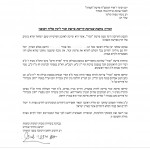Thursday, February 22, 2018, 11:19 On Wednesday, February 21, The rabbi of Shavei
Shomron, Rabbi Yehoshua Schmidt, wrote a letter to the Prison Service Commander, Lieutenant General Ofra Kliger requesting that she allow his son-in-law, Yinon Eliya Reuveni, and other Jewish prisoners to hear Parshat Zachor, one of four Torah portions read on a specific Shabbat in the Jewish calendar, read with a minyan.
Reuveni is serving a prison sentence for torching a church in an arson incident. He and other Jewish security prisoners are being held under stringent conditions. They are heavily guarded, separated from other prisoners, not allowed cell phones, and not allowed to pray with a minyan. Many rights granted to other prisoners are not granted to them.
This coming Shabbat, February 24, the Shabbat prior to the Purim holiday, is Shabbat Parshat Zachor, on which Parshat Zachor (Deuteronomy 25:17-19) is read. The reading is obligatory according to the Torah and as such, due to its importance, Rabbi Schmidt requested that Jewish prisoners be allowed to hear the reading with a minyan: “This coming Shabbat is the Shabbat of Parshat Zachor, one of the four Torah portions read on Shabbat at this time of year in addition to the weekly Torah portion. I ask that my son-in-law, Yinon Eliya Reuveni, who is sitting in the Sharon Prison, be permitted along with millions of Jews all over the world to read Parshat Zachor. There is no reason for you [Lieut.-Gen. Ofra Kliger] to prevent my son-in-law, who is a religious man, from fulfilling this obligation.”
Rabbi Schmidt elaborated to the Prison Service Commander what the religious obligation is and cited sources supporting his request: “Reading Parshat Zachor is special in that its obligation is binding according to the Torah, as stated in the Shulchan Arukh… Parshat Zachor must be read from a ritually acceptable Sefer Torah… The reading of Parshat Zachor must be ‘with ten’, that is with a minyan of men…’ Therefore I ask that my son-in-law, Yinon Eliya Reuveni and the other Jewish prisoners interested in fulfilling this commandment, be allowed to fulfill it in the Jewish prisons of the Land of Israel.
“I regard this as your religious, moral and humane obligation to ensure that [every prisoner] interested be able to fulfill this great and important commandment,” concluded the rabbi. See here for the full text of the letter.
In general the Prison Service allows Jewish prisoners to pray with a minyan and only certain security prisoners are prevented from doing so. For reasons that are unclear the Prison Service imposes very stringent conditions on Jewish security prisoners.
Honenu is working towards obtaining permission for Jewish prisoners to hear Parshat Zachor read with a minyan.

